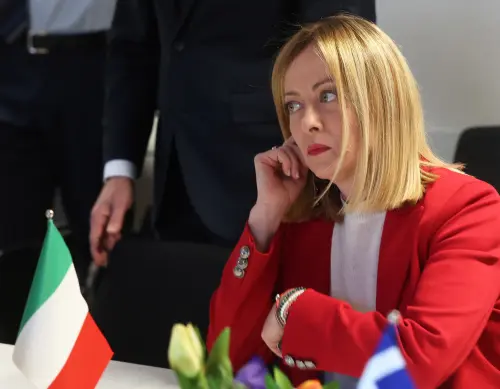Italian Prime Minister Giorgia Meloni is currently navigating a complex political landscape as Europe reassesses its defense strategies. A nationalist with strong ties to the U.S., she faces the challenge of reconciling her ideological alignment with Washington and Italy's strategic obligations to the European Union.
Meloni was notably the only EU leader to attend Trump's inauguration in January and has consistently refrained from criticizing the U.S. president, even amidst his controversial actions. Although she has participated in emergency discussions with European partners regarding the disruptions created by Trump’s foreign policy, her engagement has occasionally appeared lackluster. Critics in Italy have accused her of isolating the country within the EU.
Since taking office in 2022, Meloni has rejected claims that she is unduly influenced by Trump, asserting her commitment to both Europe and the West. She stated to parliament, "I don't blindly follow either Europe or the United States... I want the West to be compact."
Since founding her Brothers of Italy party in 2012, she has prioritized close relations with the United States in her foreign policy while tempering her earlier euroscepticism. Trump's assertive approach has unsettled pro-Atlanticists in Europe, pressing the continent to swiftly reconsider its geopolitical strategies and strengthen its defenses.
The ongoing turmoil has complicated Meloni’s aspirations to serve as a conduit between Europe and Washington. France and Britain, both nuclear powers, have taken a leading role in responding to Trump, while Germany has been making headlines with its plans to enhance military capabilities.
Politology professor Giovanni Orsina noted that Meloni currently lacks the leverage to mediate with Trump, suggesting she might be able to take on a more influential role if Trumpism evolves into a more constructive phase.
Last month, Meloni called for an immediate summit with the U.S. and its allies after Trump criticized Ukrainian President Volodymyr Zelenskiy; however, her request went unheeded by Washington. Sources close to Meloni revealed that she is seeking a meeting with Trump for late March or early April, coinciding with the EU's plan to impose counter tariffs on 26 billion euros’ worth of U.S. goods in reaction to U.S. tariffs on steel and aluminum.
In her address, Meloni expressed doubts regarding the efficacy of retaliatory tariffs, advocating for continued military cooperation with the United States within NATO. In light of Trump's potential future actions, the European Commission has outlined plans to increase the bloc's military spending by 800 billion euros, while France has extended offers of support to its European allies.
Meloni emphasized that while Europe must prepare to contribute to its defense, it is "naive" to assume it can do so independently of NATO. Italy's defense spending remains significantly below NATO's recommended threshold of 2% of GDP; in 2024, it will amount to just 1.5%. This reality undermines Italy’s position within the alliance.
Kurt Volker, a former U.S. NATO ambassador, underscored Trump’s expectation that all allies must contribute financially to defense, suggesting Italy could be scrutinized. However, Meloni confronts resistance from her coalition partner, the far-right League, regarding involvement in the European Commission's defense initiative, "ReArm."
Moreover, public sentiment in Italy largely opposes increased defense spending, with recent polls indicating that 39% of voters are against ReArm, compared to 28% in favor. The influential anti-war sentiments embodied by Pope Francis further complicate the issue.
Nonetheless, Italy’s substantial defense industry is at risk of missing economic opportunities associated with this initiative. European Commissioner for Defence Andrius Kubilius stressed the importance of leveraging this moment for growth and job creation within the sector.
Nathalie Tocci, head of Italy's Institute of International Affairs, pointed out that Meloni cannot indefinitely balance her loyalties between Washington and Brussels. She suggested that while Meloni's instincts may align with America, her pragmatic approach will guide her decisions, recognizing Italy's deep economic ties with Germany and its obligations to Europe.
